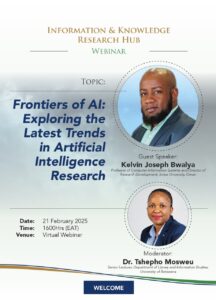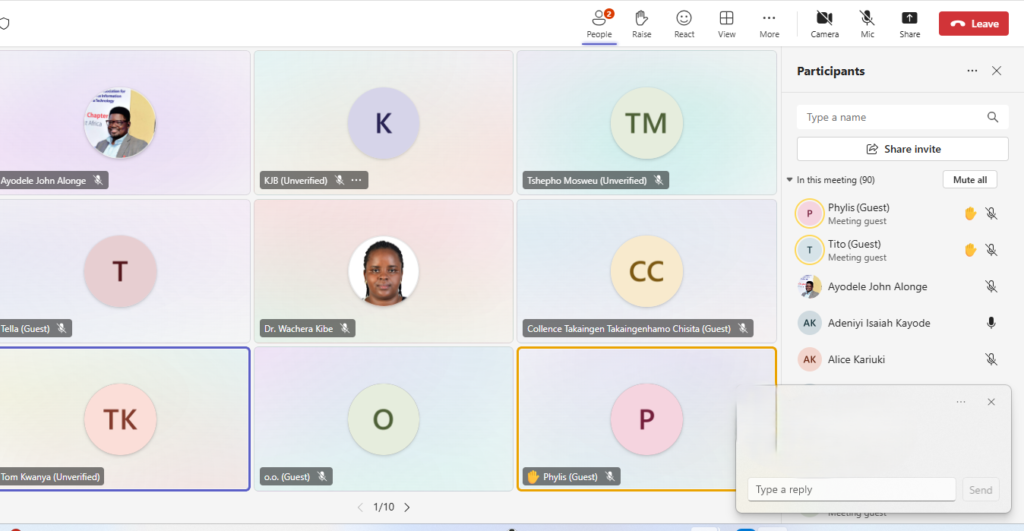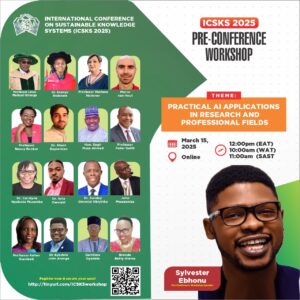You can also SUBSCRIBE to our Newsletter Here
Artificial Intelligence (AI) is here to stay, whether we like it or not. The recent webinar titled “Frontiers of AI: Exploring the Latest Trends in Artificial Intelligence Research” brought together leading AI experts to discuss the latest advancements, challenges, and opportunities in the field.
AI for Research: SciSpace-Research for Students, Academics, and Librarians with All-in-One AI Tools
Webinar Recap
The webinar, held on 21 February 2025, was organized by the Information & Knowledge Research Hub, a group dedicated to fostering discussions and exploration in diverse aspects of information and knowledge management. The hub serves as a space for curious minds and lifelong learners, and is coordinated by Prof. Tom Kwanya.

The event featured distinguished guest speaker Professor Kelvin Joseph Bwalya, Professor of Computer Information Systems and Executive Director of Research Development at Sohar University, Oman. The session was moderated by Dr. Tshepho Mosweu, Senior Lecturer, Department of Library and Information Studies, University of Botswana.
Key Takeaways from the Webinar
1. Human-Machine Collaboration is the Future
One of the critical discussions in the webinar highlighted the need for human-machine collaboration in AI development. Professor Bwalya emphasized that AI and humans must work together, with machines learning from data while humans push innovations further. Encouraging continuous man-machine interaction will be key to improving AI capabilities and ensuring AI works equitably across different applications.
2. Africa Must Invest in Groundbreaking AI Innovations
Despite Africa’s growing AI landscape, there is still a lack of groundbreaking innovations. While Kenya has attracted major AI investments, including Microsoft, many African nations are not yet leveraging their full potential in AI research and development. The webinar stressed the importance of Africa moving beyond being consumers of AI and instead becoming creators of homegrown AI solutions that can shape global AI advancements.
3. The Role of AI Governance and Policy Frameworks
The conversation around AI governance and policy remained central. Discussions covered the European AI Act (July 2024) and the African Union’s Continental AI Strategy (July 2024), both of which aim to regulate AI responsibly. Participants highlighted the need for African governments to create AI policies that not only regulate but also promote innovation while safeguarding ethical AI practices.
4. AI’s Impact on Information Science and Knowledge Management
AI is reshaping library and information science by automating metadata management, semantic analysis, and knowledge organization. Professor Bwalya emphasized that AI thrives on structured, linked data, necessitating a shift in skill sets and curricula for African information professionals.
He stressed that traditional information management approaches are evolving, and professionals must embrace AI-driven data analysis, knowledge representation, and machine learning applications to stay relevant in the digital age.
5. The Need for Africa-Based AI Development
A major concern raised was the fact that most AI systems are designed in Western countries, often overlooking African data and perspectives. This lack of representation in AI development results in bias and misinformation when applied to African contexts.
Participants called for African-centered AI development, focusing on local languages, cultures, and socio-economic realities. There was also a discussion on data sovereignty, ensuring that African data remains under African control rather than being monetized by external entities.
6. AI and the Global Innovation Race
The global AI competition is accelerating, with China, the US, and Europe leading the way. Elon Musk’s Grok AI, along with China’s latest AI advancements, have heightened the competition in superintelligent AI systems. The discussion raised concerns about Africa’s position in this AI race, with a call for governments and institutions to prioritize AI investment and participate more actively in international AI development.
Looking Ahead: Africa’s AI Future
The webinar concluded with a call to action: Will Africa lead in AI, or will it continue playing catch-up? Policymakers, researchers, and industry leaders must take bold steps to ensure Africa is not merely a consumer of AI technology but an innovator and contributor.

With initiatives like Agenda 2063 and emerging AI governance frameworks, Africa has a strong foundation to build upon. However, the continent must move beyond discussions and take concrete actions toward AI research, policy development, and cross-sector collaborations.
Final Thoughts
The webinar reinforced the urgency for African researchers and policymakers to actively participate in shaping AI regulations, developing AI-driven solutions, and integrating AI into various industries.
Participants emphasized that collaboration is key, advocating for interdisciplinary partnerships between AI researchers, legal experts, policymakers, and business leaders. Only by working together can Africa bridge the gap and establish itself as a force in AI development.
Appreciation goes to Professor Kelvin Joseph Bwalya and Dr. Tshepho Mosweu for leading this engaging and thought-provoking discussion, as well as Prof. Tom Kwanya and the Information & Knowledge Research Hub for organizing the event.
Register for a similar webinar, –Practical AI Applications in Research & Professional Fields
...For the latest news update, Subscribe to our WhatsApp Group Chat (Click Here)
You can also SUBSCRIBE to our Newsletter Here
Have any questions, send us a mail via info@optimisticscholar.com or Click Here
Get real time update about this post category directly on your device, subscribe now.

